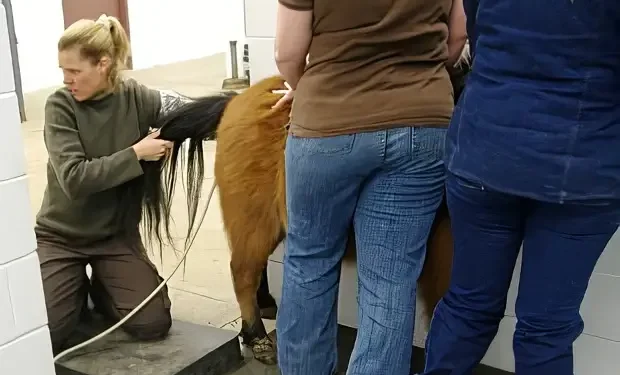On December 1, 2024, farmers and animal health professionals across England will face significant fee increases for essential services.
Announced by the UK government, these changes are part of a broader strategy to achieve full cost recovery (FCR) for statutory services, impacting rural communities and agricultural businesses nationwide.
Government’s Rationale for Higher Fees
The decision to increase fees stems from the government’s commitment to reduce the financial burden on taxpayers while ensuring that critical services remain sustainable. The Animal and Plant Health Agency (APHA) leads this initiative, covering a range of services, including animal gatherings and disinfectant approvals.
According to the APHA,
“The review aims to ensure those who benefit from these services bear their costs.”
The government asserts that this strategy will balance public spending while securing the future of animal health operations. However, critics argue it may disproportionately affect smaller farms already struggling with tight profit margins.
Fee Adjustments and Impact on Services
The planned increases will impact two major services: Animal Gathering Orders and the Defra Disinfectant Approval Scheme. These changes will see noticeable hikes in service charges:
Service |
Current Fee (£) |
New Fee (£) |
Increase (%) |
|---|---|---|---|
| Market application (basic visit) | 379 | 433 | 14% |
| Show application (large event) | 408 | 467 | 14% |
| Disinfectant approval (annual fee) | 590 | 677 | 15% |
The APHA stresses that the increases are necessary to ensure a fair system where users of these services cover their full costs rather than relying on public funding.
Details of the fee changes are provided in Schedule of Fees
Farmers Face Rising Financial Pressures
For small-scale farmers, these changes are more than just numbers—they represent a growing financial burden. Many in the industry have voiced concerns about how these increased costs will affect their ability to remain competitive.
Farmers in rural areas may face additional challenges:
- Increased operational costs, particularly for those who regularly participate in livestock markets.
- Reduced profitability, especially for farms operating on slim margins or with limited cash flow.
- Administrative strain from managing additional regulatory requirements, which may be harder for small teams to handle.
Agricultural consultants warn that these pressures could lead to a decline in smaller farming operations, with some forced to merge or cease trading altogether.
Animal Gatherings Order and Defra Disinfectant Approval Scheme Fee Increases
Animal Gatherings Order
| Activity | Existing Fees (£) | FCR Fees (from 01/12/2024) (£) |
|---|---|---|
| Market – Application – Basic Visit | 379.00 | 433.00 |
| Market – Application – with Additional Visit | 685.00 | 780.00 |
| Market – Re-approval – Basic Visit | 340.00 | 387.00 |
| Market – Re-approval – with Additional Visit | 486.00 | 550.00 |
| Market – Additional In-Year – 1 Visit | 318.00 | 362.00 |
| Show – Applications – Basic Visit | 236.00 | 283.00 |
| Show – Applications – Larger Show Visit | 408.00 | 467.00 |
| Show – Re-approval – No Visit | 168.00 | 201.00 |
| Show – Re-applications – with Visit – Low risk | 171.00 | 329.00 |
| Show – Re-applications – with Visit – Medium or high risk | 229.00 | 329.00 |
| Additional Veterinary Officer Time (per 15 minutes) ex travel | 22.00 | 24.00 |
| Veterinary Officer Travel Time (per 15 minutes) | 22.00 | 24.00 |
Defra Disinfectant Approval Scheme
| Purpose | Existing Fees (£) | FCR Fees (from 01/12/2024) (£) |
|---|---|---|
| Annual fee for manufacturers who have an approved product | 590 | 677 |
| Fee for an application for a new approval | 1,399 | 1,399 |
| Use in relation to diseases of poultry (1 dilution rate) | 3,778 | 4,630 |
| Use in relation to diseases of poultry (3 dilution rates) | 4,172 | 5,002 |
| Use in relation to tuberculosis (1 dilution rate) | 1,666 | 2,478 |
| Use in relation to tuberculosis (3 dilution rates) | 2,050 | 2,646 |
| Use in relation to foot-and-mouth disease | 3,166 | 4,705 |
| Use in relation to swine vesicular disease | 3,166 | 4,705 |
| Use in relation to other instances (1 dilution rate) | 1,032 | 1,605 |
| Use in relation to other instances (3 dilution rates) | 1,131 | 1,711 |
Critics Warn of Unintended Consequences
While the government remains steadfast in its approach, industry leaders and advocacy groups caution against potential downsides.
The National Farmers’ Union (NFU) has warned that these additional costs will make producing food more expensive, potentially push already struggling family farms “to the bone,” and risk food supply chains, leading to higher consumer prices.
Animal welfare groups have also raised alarms, suggesting that the added financial burden might lead some farmers to cut corners, potentially compromising the health and welfare of livestock.
Balancing Sustainability with Affordability
The government insists that the new fees are designed to create a sustainable, long-term model for animal health services.
However, the challenge lies in balancing sustainability with affordability. Farmers are already adapting to rising costs in other areas, from feed and fuel to regulatory compliance, and this latest fee hike adds another layer of complexity.
Despite the criticism, APHA maintains that the new fee structure is necessary.
“Without these adjustments, the system risks becoming unsustainable, placing both animal welfare and public safety at risk,” the agency stated in a recent press release.
What Farmers Can Do
Farmers and industry stakeholders are encouraged to engage with the government during this transition:
- Participate in consultations to voice concerns and provide feedback on implementation strategies.
- Explore financial assistance programs designed to ease the burden of regulatory compliance.
- Collaborate with industry groups to advocate for fairer fee structures in the future.
While the road ahead may seem daunting, proactive engagement will be crucial in shaping policies that work for all sectors of the agricultural community.
The coming fee hikes mark a significant shift in the UK’s approach to funding animal health services. As farmers brace for these changes, the focus must remain on safeguarding both agricultural sustainability and the welfare of the animals they care for.
Sources: THX News, Department for Environment, Food & Rural Affairs & Animal and Plant Health Agency.









